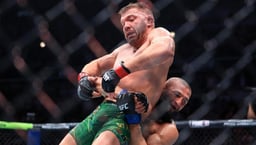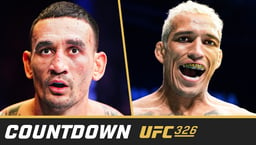
Issue 035
March 2008
UFC Matchmaker
When it come to the power stakes in mixed martial arts (MMA), few people can rival the position of Joe Silva. Though his name is often spoken on UFC broadcasts, in articles and news reports, few know anything about him, or even that he is the second most powerful man in the Ultimate Fighting Championship (UFC) after Dana White.
The unassuming Virginia native and life-long martial artist prefers to let his boss take the limelight, and when asked to describe himself immediately gives us a taste of his sardonic and self-deprecating humour. “I’m the little short guy who comes into the Octagon after the fights to congratulate the fighters,” he jokes. “I’m the match maker, my official title is Vice President of Talent Relations, but nobody understands what that means, and I do a lot of things, but the most important that I probably do is the match making. That’s cutting deals with fighters, getting contracts signed, deciding who’s going to fight who.”
If you’re thinking match making is an easy job and simply consists of putting two names together and making a fight, you’re mistaken. Match making is a subtle art, and doesn’t come without it’s stresses. “You’ve got a lot of demands on you,” says Joe. “Dana [White, UFC president] is my direct boss who I have to answer to, of course Dana always has his ideas as to what he wants to accomplish, I have the things that I think are good to do, but also are the fighters available? Are they injured? Who is owed a fight?
“All these guys are under contract, and you have to get them fights in a certain amount of time. You have a lot of time constraints, and they’ll affect fights. Also a lot of times, you’ll have a fighter say publicly ‘I’ll fight anyone’, but that doesn’t mean that’s what they’re saying to me. People go ‘Why didn’t he fight him?’ and I’ll go, ‘Well, I tried to make that fight and they refused to do it’. So there’s a lot more than just going, ‘I like this guy and this guy, let’s have them fight’. There’s a lot more to it.”
If this doesn’t already sound like juggling a dozen odd-shaped balls in the air at once, consider that the UFC hectic schedule shows no signs of slowing down. “We used to do like five or six a year, now we’re doing 30. It’s very difficult. I have almost 200 people under contract, and I have to keep track of all that, make sure they’re getting their fights on time, that I don’t breach anybody’s contract, try to keep everyone as happy as I can and make good fights at the same time.”
One of the true pioneers of this sport, Joe has been involved in MMA for 13 years, having worked directly with the UFC before Zuffa, before regulation, and in some cases, before there were even any rules. A chance glimpse of an advert in a magazine was followed with a phone call, and the rest, as they say, is history. “I’d done martial arts all my life, and when the first UFC came out I really clicked with it,” says Joe. “It was very similar to what I’d been telling people as I was growing up. I’d wrestled, and I’d done boxing and kickboxing. I had a more realistic take on martial arts than the people in the place where I lived.
“When they did the second UFC, they took out an ad in Blackbelt magazine that had the number for SEG, the parent company at the time. I called them up and kept bugging them, they put me through to Campbell McLaren, he was like the Dana at the time, he ran the show, we talked for like two hours and I gave them a bunch of my ideas. As time went on, they were using more and more of my ideas, and they had me doing things like working with the commentators, bring them up to speed on things. I would do fighter interviews, I would give match-up ideas, I worked with Jeff Blatnick on the rules of the show as the rules evolved throughout. My involvement grew and grew throughout the years, and when Zuffa bought the company they made me a vice president.”
Having worked as something of an all-round consultant up until the Zuffa purchase, Joe had tried his hand at everything. “It was fun because I love the sport as a whole. Even now, I’ll contribute to whatever. I used to, until recently, write the show. Where if you’d see the pieces on the fighters, ‘so-and-so is a world-class wrestler’, I’d write that. I had input on commercials. It’s fun, that’s one of the great things about this job, you get to be involved in a lot of different aspects.”
Now a major part of the day-to-day operations of Zuffa, Joe has not only seen the meteoric rise of the company and the UFC, but been there every step of the way. The ultimate fast-paced work environment, there isn’t much time to rest. “Especially now that we are doing so many,” he says. “You don’t really get much time to breathe. That’s the funny thing. I was never really that much of a traveller before UFC. I don’t really like to travel, yet I travel constantly.”
Like any UFC employee, Joe confesses to working “24 / 7”, and has been given the nickname of Mr. Cellphone, one that he grudgingly accepts. “There are times I feel like throwing it out of the window. I’m constantly on the phone, constantly on the computer. One of the things I hate about travelling internationally is those hours that I’m just not available. In that time, somebody will get injured. Something’s gonna happen and the sooner I know the sooner I can jump on it and fix it.”
Luckily for Joe, even though his duties call for him to be away from home a lot, he can count on the support of his family. “It’s hard for me to be away. Fortunately I have a very understanding wife. She loves the sport and she can deal with it. Also she sleeps early, and I sleep late, it works well. We spend our time together, she goes to bed and I really kick into gear and work from ten and night until four in the morning. We’re nocturnal people, but we make it work. And if I didn’t love it, there is no way I would do it. No way, it’s just too much.”
Something of a homebody, Joe was born and bred in Richmond, Virginia, a place he still calls home. “When I worked for SEG, I worked out of Virginia and would fly out for shows but I’d do work on the computer and on the phone. When Zuffa bought the company they wanted me to move out, they’re based in Las Vegas. I was based in Vegas for two years, but I was just miserable. Virginia is my home, it’s where my friends are, my family is, all my training partners, so fortunately they were nice enough to let me move back and I’ve made it work.”
Before placing that phone call to SEG back in 1994, Joe worked a succession of jobs with no real desire other than to keep doing his martial arts (“I was managing a video arcade. I was just a martial arts bum and that was all I really cared about”). He counts himself lucky that he was able to combine his passion with a job that gives him something back. “I was just fortunate to find something I could do that I love, but now I make a good living out of it as well,” he says.
With no college education, no formal training and no career path in mind, Joe is one of the many people in MMA who made a position their own, and this is something he feels is one of the great things about the sport. “I think that’s what you can do in a younger industry,” he says. “It’s hard when you have a real super-established industry because they have all these roadblocks set up, like ‘ have to do this to get in’. But in this there are a lot of people who were able to. It’s fun for me, there are the people who I came up with who have been in this since the beginning, and we reminisce about those old days. To see where it is now is just incredible.”
Looking forward, Joe has a busy year ahead of him with bigger shows and more events than ever, but he’s not slowing down any time soon. The passion still runs deep, and with a boss like Dana, there is no chance of slowing down. “Dana is a great leader and he is just tireless, I’m passionate about what I do and I’m going to be the best at what I do, but Dana is just like a whole other thing,” he says. “Like I can have a level where I’m happy, but Dana will never be happy until it’s total complete world domination. It drives him and that’s great and it makes everybody else work harder to achieve the vision. It’s hard when you have a workaholic boss, you can’t really slack yourself, the guy never stops working. It makes you feel lazy if you’re not busting your ass.
“We’re good at what we do, and we love what we do and we’re going to keep doing our best to grow the sport. It’ll be interesting to see the strides we’ve made so far what it’ll look like fives years from now. I can only imagine.”










